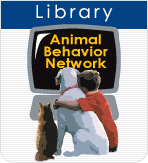|
Need Help?
|
|
Call
1-800-372-3706
to
speak to a Veterinary Behavior Technician |
|
Paws To Speak!
Member
Main Menu
|
|


Pet Professional Tip
Feeding a puppy a premium diet is important for
helping elimination training. Higher quality
diets are more digestible, produce less waste = less
clean-up= less for puppy to control (hold).
Recommend quality diets for pets. Diet plays
an important role in both health and behavior. Feed a high quality food to boarding pets, Tell clients that you provide the same food in the
clinic that you recommend and sell.
|
 |
|
Help is at your
fingertips by library, email and
phone. |

Click on
Library Icon
to learn more
|
Introduction to Nutrition
There are a vast number of
factors that influence dietary needs. There are also a large variety
of types of food and manufacturers. As a matter of fact, there is
now even a prescription "Brain Diet" (BD) to keep the brain healthy
in older dogs. The best possible nutrition is recommended by the
veterinarian supervising the health of the dog. Veterinarians are
trained in nutrition. When they exam the pet, they evaluate health
factors including coat condition. The following information is
intended for normal, healthy pets. It should not take the place of a
veterinary recommendation.
|
Dogs tend to overeat more
when fed canned food.
Provide dogs plenty of
exercise and limit food, as
needed, to maintain healthy
weights. |
Food selection
When providing food for a
puppy or an adult dog, it is recommended to choose from what are called the "premium quality" food
brands. These tend to be the most expensive
available and sold in specialty pet food stores and
veterinary clinics. They are not usually sold in
supermarkets. The difference in premium quality
foods is primarily the quality of the protein and
fat. These more expensive raw materials are higher
in digestibility and quality of proteins and
therefore explain the increased cost. The higher
quality raw materials allows the dog to grow and
develop stronger muscle, hair fibers, and all other
parts of the body. Another big advantage is that
increased digestibility results in smaller stools.
from what are called the "premium quality" food
brands. These tend to be the most expensive
available and sold in specialty pet food stores and
veterinary clinics. They are not usually sold in
supermarkets. The difference in premium quality
foods is primarily the quality of the protein and
fat. These more expensive raw materials are higher
in digestibility and quality of proteins and
therefore explain the increased cost. The higher
quality raw materials allows the dog to grow and
develop stronger muscle, hair fibers, and all other
parts of the body. Another big advantage is that
increased digestibility results in smaller stools.
|
Feed a premium food when
housetraining a puppy.
You will have less input and
output which is easier for
both of you! |

When
selecting a brand, it is generally
better to stay with a name brand like
Science Diet, IAMS, Waltham, ProPlan,
Nutro, and Nature's Recipe. The
"off-brands" might be divided into 3
categories: Price-point, Designer,
and All-Natural.
The least cost price point foods
use the lowest class of raw materials
and should be avoided. The designer and
all-natural brands often have a
compelling story, but usually do not
have the feeding trials and science to
back them up. Rely on your veterinarian
or do some deep research if going off
the beaten track of a high quality name
brand premium food.

Canned vs. Dry
Most dogs do great if fed only
dry food for meals. That means
having the food available at
distinct intervals and removing
the food when the dog walks away
from the bowl. Canned food is
indicated if attempting to
increase coat condition, part of
a medical prescription, to
increase body weight, or as a
special treat for the dog on an
as intermittent basis. It is
more efficient (and better for
the health of the dog!) to feed
a high quality, expensive dry
food rather than a lower
expensive dry plus canned food.
Dogs tend to overeat more when
fed canned food. Provide dogs
plenty of exercise and quality
food to maintain ideal weights.
Supplements
In healthy dogs with nice coats,
nutritional supplements such as
a multiple vitamin are optional
since the high quality foods
contain vitamins. Many humans
take a multiple vitamin as a
safety factor or for insurance
reasons and in dogs this is
permissible and encouraged. If
attempting to increase coat
condition, an Essential Fatty
Acid (EFA) supplement is also
suggested, although it is best
to check with your veterinarian
for dosage and quality.
|